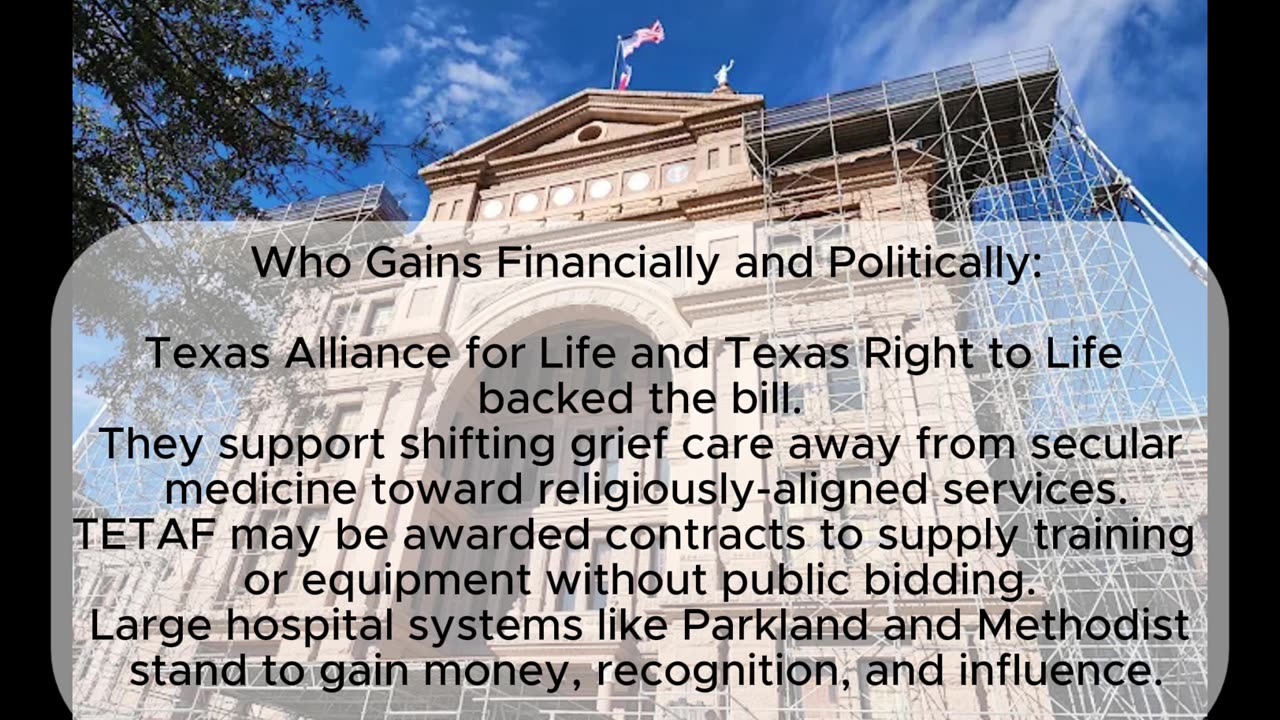Premium Only Content

"🔴 HB 37 – The Law That Promises Grief Support but Delivers Donor-Driven Control
HB 37, known as Everly’s Law, was sold as a bill to support grieving families. It promises hospitals will offer bereavement counseling and a cooling device to preserve a baby’s body for up to 72 hours after a stillbirth or neonatal death. That’s powerful. That’s emotional. That feels like real compassion.
But the deeper you read, the more this bill reveals a troubling pattern: selective care, private influence, and hidden power shifts dressed in public sympathy.
Here’s what it claims to do:
Support parents by giving them more time to say goodbye and help hospitals provide better bereavement care.
Why it sounds good at first:
Most Texans would agree that every parent deserves dignity and time to grieve. The idea of preserving a baby’s body for a few days with a special device sounds humane, not political.
What it actually changes:
It lets the state health agency decide—on its own terms—who gets access to these devices, training, and recognition. No hospital is guaranteed to receive anything. There’s no audit, no scoring system, and no public reporting.
The state can accept donations from private advocacy groups and use those funds however it sees fit—with no competitive bidding, no oversight, and no public explanation of who got what.
Who gains power and influence:
PAC-backed nonprofits like Texas Alliance for Life and Texas Right to Life, who supported the bill and now have an entry point into hospital grief care models
Vendors or contractors like TETAF who may sell devices or conduct training without having to go through public procurement
Large hospitals with existing political ties or state designations, which are most likely to qualify for grants and recognition
Who gets left behind:
Small or rural hospitals that don’t meet the technical designation or don’t have lobbying connections
Families in those hospitals who may be told this “support” doesn’t apply to them
Secular grief providers or culturally diverse professionals who may be excluded from state-backed training if the program is shaped by ideological partners
What this sets up for the future:
This bill normalizes a funding model where public grief care is shaped by private donors, not law. It creates a precedent for recognition programs with no standards, no audits, and no equity protections. If it works here, expect similar structures in end-of-life care, maternal health, or crisis pregnancy services.
Who moved it forward:
Rep. Mihaela Plesa introduced the bill, likely with sincere intent. But during committee edits, the structure changed. Language requiring a formal grant program was replaced with a loose “initiative.” Recognition was added with no transparency. Donor clauses stayed in. And Senate sponsorship came from figures aligned with major lobbying entities.
Why this matters:
HB 37 uses real heartbreak to push a framework that concentrates power, limits access, and allows grief care to be controlled by whoever funds it. The compassion is genuine—but the structure is built for control, not equality.
Bottom line:
Not every hospital will offer this care. Not every family will be supported. And the ones who do benefit may be chosen based on politics, not need.
We can do better than grief by lottery.
🔴 #HB37 #TexasLegislation #PolicyOverEmotion #WatchTheStructure
"
-
 1:20:13
1:20:13
Sports Wars
10 hours agoCollege Football UPSETS, MLB Playoff Drama, NFL Week 4
74.2K12 -
 LIVE
LIVE
GritsGG
4 hours agoQuad Win Streaks!🫡 Most Wins in WORLD! 3600+
163 watching -
 LIVE
LIVE
Spartan
1 hour agoOMiT Spartan | Watching TSM 5K with chat + Black Myth Wukong + Ranked on Infinite Maybe
23 watching -
![🔴[LIVE] Sept RCP #27💜 [English Chat] 😍DGG-a-Thon! Forever Skies maybe other game later ....💜](https://1a-1791.com/video/fwe2/ee/s8/1/0/t/e/m/0temz.0kob-small-LIVE-Sept-RCP-27-English-Ch.jpg) LIVE
LIVE
Deaf Gamer Girl
47 minutes ago🔴[LIVE] Sept RCP #27💜 [English Chat] 😍DGG-a-Thon! Forever Skies maybe other game later ....💜
67 watching -
 1:00:24
1:00:24
Jeff Ahern
7 hours ago $6.66 earnedThe Sunday Show with Jeff Ahern
41.4K15 -
 LIVE
LIVE
OhHiMark1776
4 hours ago🟢 09-28-25 ||||| Act 3 Continue ||||| Baldur's Gate 3 (2023)
191 watching -
 2:04:33
2:04:33
DooM49
5 hours ago12 Days until Battlefield 6
26.7K1 -
 17:23
17:23
Russell Brand
2 days agoThey couldn't handle this...
147K326 -
 18:18
18:18
DeVory Darkins
1 day ago $41.87 earnedPortland gets NIGHTMARE NEWS as Trump orders Troops to crush violent rioters
86.5K384 -
 1:32:21
1:32:21
JTtheSG
5 hours agoLIVE Replay - Ready To Play VOID BREAKER
22K